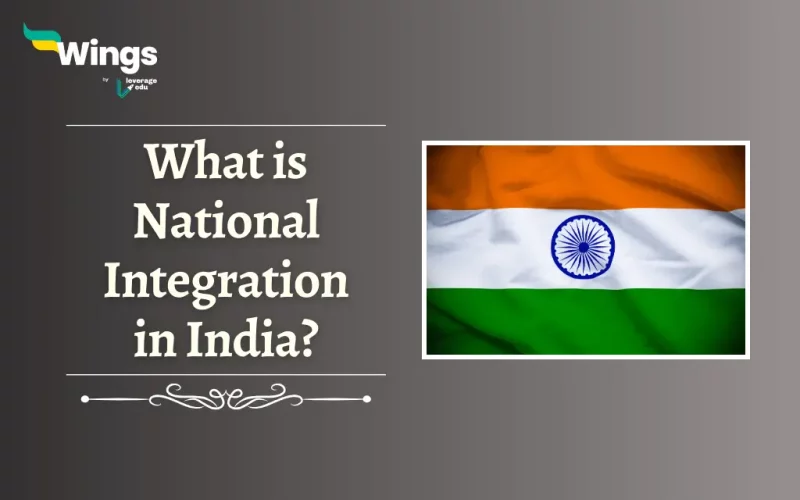India is diverse, making it a multi-cultural, multi-ethnic, and multi-lingual country. It allows its citizens to practice any religion, and the Preamble of India also talks about being Secular. But in 1961, it was not the case since communalism, casteism, regionalism, linguism, and narrow-mindedness still prevailed. Therefore, the erstwhile Prime Minister of India, Jawaharlal Nehru convened the National Integration Conference from September to October in 1961. Furthermore, the outcome of the conference was the formation of the National Integration Council (NIC) in 1962. Read on to learn more about the 4 Obstacles and National Integration Day in India.
What is National Integration?
National Integration is the act of bringing together the diverse communities and people of the nation to imbibe a sense of unity and belonging in people.
- It aims to encourage harmony and cooperation among people from different regions, languages, religions, and cultures.
- National integration fosters a strong, unified nation where diverse citizens with equal rights and opportunities respect each other’s beliefs and traditions.
- Thus, promoting unity and working towards shared goals for a stable and prosperous country.
Also Read: National Constitution Day
4 Obstacles to National Integration
In addition, the 4 Obstacles to National Integration are as follows:
Communalism
Communalism is the preference for one’s religious community over national interests, usually harming other religious groups. It originated during British rule with the Government of India Acts of 1909, 1919, and 1935, which introduced communal representation.
In addition, Communalism has grown due to the politicization of religion as seen in:
- Religious Political Parties: Examples include the Akali Dal, Muslim League, and Shiv Sena.
- Religious Pressure Groups: Such as the RSS, Vishwa Hindu Parishad, and Jamaat-e-Islami.
- Communal Riots: Conflicts in cities like Varanasi, Mathura, Hyderabad, and Amritsar.
- Religious Structure Disputes: Notably, the Ram Janmabhoomi issue in Ayodhya.
Moreover, factors sustaining Communalism include religious orthodoxy, the influence of Pakistan, Hindu chauvinism, government inaction, political manoeuvring, communal media, and socio-economic issues.
Regionalism
Regionalism refers to a strong loyalty to a specific region or state over the country as a whole. It can also extend to sub-regionalism, where loyalty is directed to a particular area within a State.
In India, Regionalism comes in different forms:
- Secessionist Movements: Regions like Khalistan, Dravid Nadu, and certain areas in Mizoram and Nagaland seek independence from India.
- Demand for Separate Statehood: Areas such as Bodoland, Vidarbha, and Gorkhaland push for their own statehood.
- Union Territories Seeking Statehood: Union Territories like Puducherry and Delhi seek to become full States.
- Inter-State Disputes: Conflicts arise over boundaries (e.g., Chandigarh and Belgaum) and river waters (e.g., Cauvery, Krishna, Ravi-Beas).
- Sons of the Soil Theory: This concept advocates for prioritizing local residents for jobs and opportunities, with slogans like “Assam for Assamese” and “Maharashtra for Maharashtrians.”
Casteism
Casteism is prioritising one’s caste over national interests, thereby stemming from caste-based politics. It manifests in several ways:
- Formation of caste-based political parties (e.g., Justice Party, Republican Party, Bahujan Samaj Party).
- Creation of caste-based pressure groups (e.g., Nadar Association, Harijan Sevak Sangh, Kshatriya Mahasabha).
- Allocation of election tickets and ministerial positions along caste lines.
- Caste conflicts between higher and lower castes or among dominant castes in states like Bihar, Uttar Pradesh, and Madhya Pradesh.
- Additionally, violent disputes over reservation policies.
State politics often feature caste group rivalries, such as Kamma vs. Reddy in Andhra Pradesh, Lingayat vs. Vokkaliga in Karnataka, and Jat vs. Ahir in Haryana.
Linguism
Linguism, the love for one’s language and its speakers, is a result of political processes similar to regionalism and communalism. It has two main aspects which are reorganizing states based on language and determining the Union’s official language.
The creation of Andhra Pradesh in 1953 led to a nationwide push for states to be reorganized by language, hence resulting in the 1956 reorganization.
- Despite this, India’s political map continued to change due to popular agitations, leading to further state divisions.
The 1963 Official Languages Act, designating Hindi as the official language, sparked anti-Hindi protests in South India and West Bengal.
- To address this, the government guaranteed that English would remain an associate official language.
- The three-language formula for schools (English, Hindi, and a regional language) has not been implemented in Tamil Nadu, thus preventing Hindi from becoming the national lingua franca.
Therefore, linguism intensified with the rise of regional parties like the Telugu Desam Party (TDP), Asom Gana Parishad (AGP), and Shiv Sena.
Also Read: National Solidarity Day
National Integration Day in India
National Integration Day is celebrated on the 19th of November every year, This is done in honour of India’s first female Prime Minister, Indira Gandhi. Additionally, the purpose behind celebrating National Integration Day in India is to promote unity, peace, love, and brotherhood among the country’s citizens.
FAQs
Common principles of national integration are common citizenship, unity in diversity, freedom of religion, secularism, equality, socioeconomic and political, and fraternity among all communities.
The key objective of National Integration Day in India is to remind people about integrity, brotherhood, and peace among themselves.
The National Integration Council was established by the then Prime Minister Jawaharlal Nehru to address the problems of communalism and regionalism in India.
Related Blogs
This is everything about the National Integration in India. Moreover, you may even read more blogs and empower yourself with knowledge regarding Civics and Polity!
 One app for all your study abroad needs
One app for all your study abroad needs













